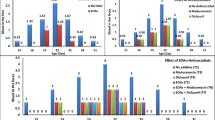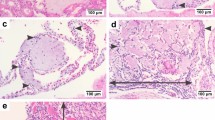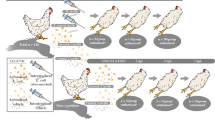Abstract
UNDER natural conditions infection with coccidia occurs as a result of the ingestion of viable sporulated oocysts, and this method of infection, that is, the inoculation of oocysts per os, is used experimentally to establish coccidia in laboratory animals.
This is a preview of subscription content, access via your institution
Access options
Subscribe to this journal
Receive 51 print issues and online access
$199.00 per year
only $3.90 per issue
Buy this article
- Purchase on Springer Link
- Instant access to full article PDF
Prices may be subject to local taxes which are calculated during checkout
Similar content being viewed by others
References
Landers, E. J., J. Parasit., 46, 195 (1960).
Tyzzer, E. E., Amer. J. Hyg., 10, 269 (1929).
Tyzzer, E. E., Theiler, H., and Jones, E. E., Amer. J. Hyg., 15, 319 (1932).
Van Doorninck, W. M., and Becker, E. R., J. Parasit., 43, 40 (1957).
Pattillo, W. H., J. Parasit, 45, 253 (1959).
Author information
Authors and Affiliations
Rights and permissions
About this article
Cite this article
DAVIES, S., JOYNER, L. Infection of the Fowl by the Parenteral Inoculation of Oocysts of Eimeria. Nature 194, 996–997 (1962). https://doi.org/10.1038/194996a0
Issue Date:
DOI: https://doi.org/10.1038/194996a0
This article is cited by
-
Macrophages facilitate the excystation and differentiation of Toxoplasma gondii sporozoites into tachyzoites following oocyst internalisation
Scientific Reports (2016)
-
Development (Schizogony) of Eimeria tenella in the Liver of Chickens treated with Corticosteroid
Nature (1970)
-
Die Entwicklung vonEimeria falciformis (Eimer 1870) in der wei�en Maus (Mus musculus)
Zeitschrift f�r Parasitenkunde (1970)
-
Development of Eimeria tenella in Avian Embryos
Nature (1965)
Comments
By submitting a comment you agree to abide by our Terms and Community Guidelines. If you find something abusive or that does not comply with our terms or guidelines please flag it as inappropriate.



